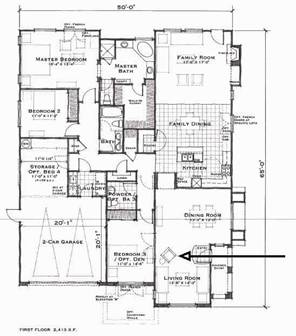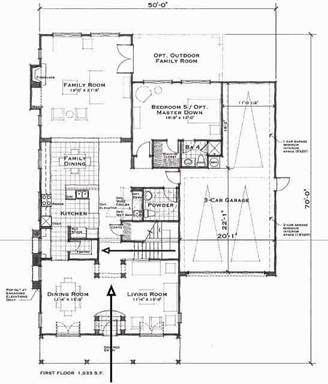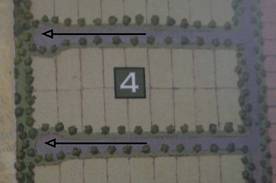 |
 |
Feng Shui
Making organization, life.
by Annie Chang, Julius Go, Brad Hill and Ryan Wong
Feng Shui is a mystical practice that stems from Taoist roots originating in Ancient China. During the Tang Dynasty (618-907 CE), Feng Shui was confined to the ruling classes. It was originally used to choose burial sites for the wealthy and palace locations for royalty. They rigorously studied landscapes, calculated compass directions and diagnosed the positioning of buildings within land sites. Feng Shui has not departed far from its ancient origins. It has, however, moved from a systematic science to more of a form of art.
Feng Shui translated to English means “wind” and “water”. These elements pertain to the balance of the flow of energy which determines the harmony and well-being within a specified local. This flow of energy—called Ch’i—is influenced by a number of factors. In the context of the home, Feng Shui draws heavily from factors such as location, architecture, visual aesthetics, and furniture placement to attract and promote the flow of good ch’i as opposed to bad ch’i which can be detrimental to the wealth, health, and relationships of the household. Bad ch’i can be caused by projections in the immediate environment pointing in the direction of the home called “poison arrows”. Poison arrows, exemplified in corners of homes, direct bad ch’i towards a home or room. This, however, can be remedied by certain Feng Shui principles. Important to the positive flow of ch’i is the balance of yin and yang. Yin and yang represent all the opposing yet interdependent energies of the universe with yin representing the negative forces of energy and yang the positive forces of energy. The balance of these opposing energies, which is conducive to positive ch’i, can be manipulated by effective Feng Shui.
The Feng Shui Local Community
Ch’I is a fundamental element of Feng Shui and can be defined as a “universal force or cosmic breath that all things are thought to possess” (Chin, p.2-3). Ch’I can also be thought of as an invisible flow similar to the flow described by Akin and Robbins in Money and Modernity. This flow in Feng Shui can enter structures and leave structures and usually enters through the front door. Ch’I can also speed up and slow down by slopes or obstacles. An ideal building would allow Ch’I to enter through the front door and flow through the house at a medium pace. “Feng Shui in its purest form simply consists of ch’I management, which means keeping the energy moving, not too fast, and not too slow” (Chin, p.4).
There is at least one community in Irvine that has used Feng Shui to give more value to their homes and attract a specific population of buyers. The project manager for the builder of this community was quoted in “Professional Builder” stating that the builders “wanted to appeal to the market from a cultural and lifestyle perspective – not just an architectural one. Eighty percent of our buyers are not Caucasian, [the project manager] says of his chiefly Asian and Middle Eastern buyers” (Stromberg). The builder took this population of buyers that they were aiming for and contracted designers who could design floor plans that Asian and Middle Eastern buyers would enjoy. The Director of Sales for this project also stated that he dealt with Feng Shui and the buyers to show that buyers specifically wanted a house that was built with Feng Shui principles. The article later states that the “design team used Feng Shui principles and added thoughtful features, such as a cabinet near the front door for storing shoes” (Stromberg). The design director for this project also stated that when he designed the floor plans he used certain basic principles of Feng Shui. Below are parts of the floor plans for this community as well as other examples of good and bad Feng Shui in architecture:
 |
This floor plan shows how the energy flows in through the front door and does not flow straight out the back door. When the front door is aligned with the back, “the ch’I passes through too quickly and adversely affects the luck of the tenants” (Lip, p. 35). Typically it would be favorable to have the ch’I reside in the house so that it will bring good luck and prosperity.
|

|
- This floor plan exhibits the same principles as before regarding the alignment of the front door and back door. A new feng shui principle is also seen here since the plan has a stairway. If the stairs lead directly to the front door then that is bad feng shui since the flow of ch’I will go down the stairs and directly out the front door making so the family does not receive any luck or prosperity. |

|
- The above photos and the image to the left are all cul-de-sacs from the housing community. Notice how none of the cul-de-sacs have houses at the end or even close to the end. This is due to the fact that in feng shui the bad ch’I flows down the street and hits the house at the end of the cul-de-sac bringing them bad luck and misfortune. When this community was designed, there were no houses built at the ends of the cul-de-sacs because those houses would not sell as easily. |
The Interview
Annie: Hi! What is your name and can you state where you were born, what language you speak, and what religion you practice?
Woman: Hello. My name is Mei Hsin Liu Chang and I was born in Taiwan, and I speak Mandarin. My mom and dad were both born in China; I moved to America in the late 70’s. I am a Buddhist, and I practice my religion everyday.
Annie: Would you consider yourself very “Chinese” or have you adapted to American culture since you’ve been here for over 20 years.
Woman: I do consider myself Chinese. I am able to distinguish Chinese culture from American culture. The only time I switch into my America culture gear is when I’m dealing with my children.
Annie: Do you know anything about Feng Shui? Is it something you believe in?
Woman: I know a lot about Feng Shui. Every time I buy a house I consult a professional Feng Shui master. Even for our current house a Feng Shui Master was consulted. My good friend is a Feng Shui master and he always helps me out in what kind of house to buy. I ask him every time.
Annie: What aspects of the house do you look for in a prospective house? I’m sure you can’t have your house be perfect, but what things would you choose to have over others?
Woman: I choose things that have to do with health, prosperity, and wealth. I think wealth is a very important element in Chinese culture. A lot of things we do are geared towards getting more wealth, like red envelopes, burning money, etc.
Annie: Do you believe that Feng Shui works? Has it worked for you personally?
Woman: I believe in Feng Shui. I think it works. I believe in Ch’i, and the flow of the house and the people in it. Just in case it doesn’t work, it’s still better to be safe than sorry. For my house personally I feel that it works. Ever since I moved to this house in Arcadia my family has been better. We have made more money and a lot happier and peaceful. Our old house in Monterey Park had very bad Feng Shui. It wasn’t extremely bad, but it got drastically better when we moved to Arcadia in a house with good Feng Shui.
Annie: Do you think it’s fair that people who practice Feng Shui get money as opposed to people who work really hard who don’t get as much money?
Woman: I don’t think people practice Feng Shui purely for money. I think it is more the belief of flow of ch’i, and our Chinese culture. I think people out of Chinese culture want money so they do Feng Shui, but for the Chinese we do it because we believe in Feng Shui, yin and yang, and luck.
This interview with a middle-aged Chinese woman is significant to the project in many ways. It helps distinguish money and Feng Shui, because often times people not of Chinese culture associate the practice of Feng Shui purely with wealth, but as pointed out here it is not only of wealth, but of Chinese culture, and belief in ch’i. Here, money isn’t treated like money anymore, it goes beyond the physical matters and is intertwined with culture and abstract beliefs.
The Correlation of Feng Shui and Money
Although seemingly unrelated, Feng Shui relates in several ways to what we’ve learned in class. It is important to note that although Feng Shui has many ties to wealth, that there is also a bigger picture. How do Feng Shui practices and the Chinese beliefs about money tie into the philosophical arguments about the value and meaning of money? How is the Chinese way of thinking about money related to other cultures and their beliefs about money and its power?
The concept and practice of Feng Shui is a very interesting topic, but “so what?” To an interested Chinese-American or Taiwanese-American buyer, the value of a house is increased if it has good Feng Shui, just the same way a motor sport enthusiast would value a more powerful vehicle than one of comparable quality but less power. So the architect or previous home-owner has created more value through the application of Feng Shui principles on the home. Stated in another way, value is created through the labor of the architect or previous home-owner, but this is true with any upgrade or special design of a home. However, most upgrades or designs of homes are merely aesthetic or practical and do not have an emphasis on bringing good fortune or wealth. The creation of value through labor begins to sound very familiar and it is soon realized that it sounds just like Marx and Locke. Value is created or added when someone has put labor, or put a piece of themself, into it. Also, in the case of Feng Shui and the benefits reaped from its application, the rewards are alienable from the practice itself. That is to say that the wealth that is resultant is seen separately from the act of following Feng Shui principles. They are cause and effect, not one in the same.
While the practice of Feng Shui might be distinctly Chinese, the beliefs of money that permeate the wealth aspect of Feng Shui are common in a number of societies. Take for example the fact that Feng Shui’s goal in terms of wealth is to accumulate more for the owner of the home. To a person from a Western culture, it seems perfectly normal and no questions will be asked. The accumulation of wealth seems normal because we in the West have seen it so often that it has become naturalized. There are other societies, like the Kawelka tribe from Papua New Guinea in “Ongka’s Big Moka” that believe it is good and prestigious to give wealth away in competitive gift exchange. It is the biggest giver, not the biggest hoarder, who is subject to the most prestige. Also, comparing observers of Feng Shui to the South American peasants in Michael Taussig’s The Genesis of Capitalism amongst a South American Peasantry, Feng Shui is comparable to the devil. The peasants see the land-owners getting more wealthy by the work of the devil, while on another continent, people who practice feng shui believe it is the positive flow of chi, or Qi, that helps them acquire more wealth. It is almost the same belief seen from both sides – the benefactors and an outside observing party. For the observing party, it is seen as the work of the devil, to be completely evil. As for the believers of Feng Shui’s benefits, it is a great and proper thing that this thing they’ve applied in their homes is helping them and their family live a better life.
|
 |








